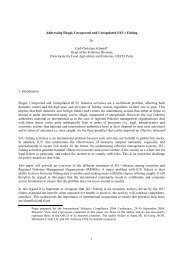Fishing Vessel Monitoring Systems: Past, Present and Future
Fishing Vessel Monitoring Systems: Past, Present and Future
Fishing Vessel Monitoring Systems: Past, Present and Future
Create successful ePaper yourself
Turn your PDF publications into a flip-book with our unique Google optimized e-Paper software.
VMS: <strong>Past</strong>, <strong>Present</strong> <strong>and</strong> <strong>Future</strong> 33<br />
When such a requirement is combined with security connectors at both the<br />
terminal <strong>and</strong> the antenna, it is an effective means of preventing one of the most<br />
primary means of VMS data tampering: removal of the VMS terminal from the<br />
vessel to be tracked.<br />
The issue of security as related to VMS is, of course, a complex one with at least<br />
two, distinct aspects: the reliability of the data gathered <strong>and</strong> keeping that data,<br />
once it is gathered, totally secure against unauthorised access <strong>and</strong> use. The first<br />
of these, basically an issue of system <strong>and</strong> data tampering, is amply covered in<br />
this study’s chapter on vessel equipment security.<br />
5.3 Data access <strong>and</strong> distribution<br />
Security of access <strong>and</strong> use is a quite different question. It is based upon the fact<br />
that VMS data is inherently confidential in that data related to the exact positions<br />
where a fishing vessel operates benefits from the concept of commercial<br />
confidentiality. There is even an on-going debate as to whom VMS data belongs,<br />
the vessel operator or the agency operating the VMS. In either case the vessel<br />
operator has a right to expect that VMS data be treated with the care <strong>and</strong> respect<br />
that it deserves.<br />
The difficulty of maintaining confidentiality of VMS data is closely related to the<br />
use to which it is put. Data that remains in, for example, a FMC that operates in<br />
st<strong>and</strong>-alone mode, poses far fewer security questions than one that is networked,<br />
providing data to users distributed in different places. Being able to assure this<br />
security is key, as the successful continued operation of a VMS requires at the<br />
very least the tacit cooperation of the fishing industry.<br />
5.3.1 Two aspects of data security<br />
Once again, there are two aspects to this part of the VMS security issue, the<br />
pure, technical aspect <strong>and</strong> the question of misuse of data by authorised users.<br />
The first aspect is a pure information technology issue, <strong>and</strong> has to do with<br />
matters like user identification (passwords, readable ID cards, etc.), firewalls to<br />
prevent unauthorised external access, <strong>and</strong> restricted physical access to system<br />
hardware.<br />
There is no stock solution to this data processing <strong>and</strong> telecommunications issue<br />
as the adequate arrangement is directly related to the results of a security risk<br />
analysis that should accompany the implementation of any VMS. This<br />
examination should cover everything from the value of the data gathered (i.e.<br />
how much would an unscrupulous vessel operator be prepared to pay for the<br />
position data of a successful vessel) to a security assessment of existing data

















